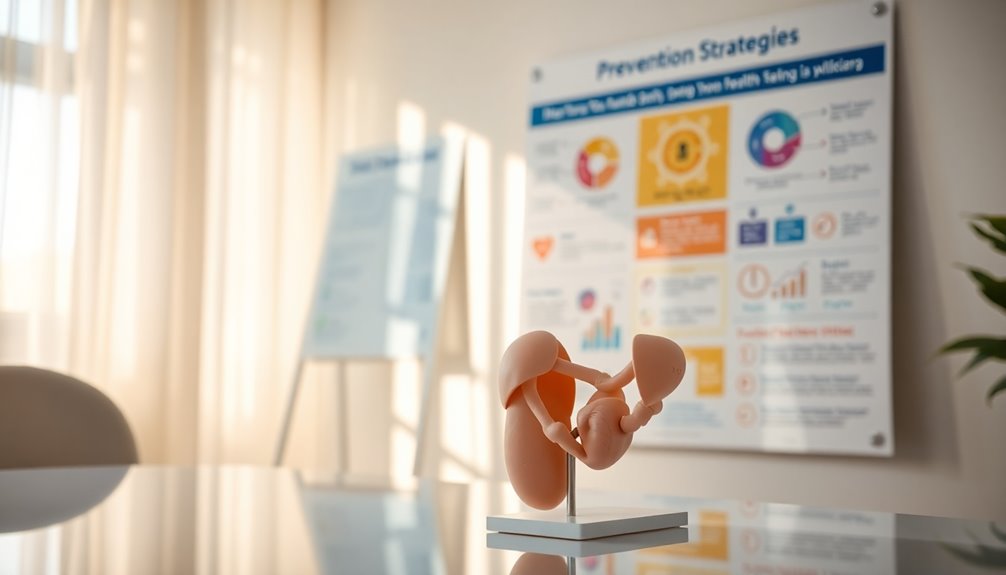Anal sex doesn't directly cause cancer, but it can be a factor in raising your risk for anal cancer. The primary concern is human papillomavirus (HPV), which spreads through intimate contact, including receptive anal intercourse. If you have multiple partners or don't practice safe sex, your risk increases due to HPV. Having a strong awareness of your sexual health and incorporating regular screenings can help. Also, HPV vaccination is effective in reducing your chances of developing anal cancer. There's a lot more to understand about prevention and safe practices, so keep exploring to stay informed.
Key Takeaways
- Anal sex does not directly cause anal cancer, but it may increase the risk of HPV transmission, a key factor in cancer development.
- HPV, particularly high-risk types, is the primary concern associated with anal cancer, not anal sex itself.
- Safe sexual practices, including condom use, can significantly reduce the risk of HPV transmission during anal intercourse.
- Limiting the number of sexual partners and maintaining open communication about sexual health can further decrease the likelihood of HPV exposure.
- Regular screenings and HPV vaccination are essential preventive measures for individuals at higher risk for anal cancer.
Understanding Anal Cancer

Anal cancer, though less common than other types, poses significant health risks that you should be aware of. This type of cancer primarily starts in the anal canal, which is small yet vital for waste expulsion.
Most anal cancers are linked to human papillomavirus (HPV) infection, often transmitted through anal sex. Risk factors include multiple sexual partners, smoking, and a history of related cancers.
Symptoms like rectal bleeding and anal pain can be mistaken for hemorrhoids, so it's important not to ignore them. If you have a weakened immune system or are at high risk, regular health screenings and anal Pap tests are essential for early detection.
Staying informed about these factors can help protect your health.
The Role of HPV

When you engage in anal sex, you increase your risk of human papillomavirus (HPV), a key factor in developing anal cancer.
HPV spreads through skin-to-skin contact, and certain types, like 16 and 18, are particularly dangerous.
Understanding how HPV works and the importance of vaccination can help you take proactive steps to protect your health.
HPV Infection Overview
Human papillomavirus (HPV) plays an essential role in the risk of developing anal cancer, as it's linked to about 90% of cases.
HPV types 16 and 18 are particularly concerning, as they can be transmitted through skin-to-skin contact during receptive anal intercourse.
While most HPV infections are asymptomatic and resolve on their own, persistent infections can increase the risk of anal cancer.
Engaging in receptive anal sex can heighten your chances of exposure to HPV, making it crucial to be aware of this risk.
Fortunately, you can prevent HPV infection through vaccination, especially before becoming sexually active.
Taking these steps can considerably reduce your risk of anal cancer associated with HPV.
HPV Transmission Methods
Understanding how HPV is transmitted is key to reducing your risk of infection and related health issues. HPV is primarily spread through intimate skin-to-skin contact, including vaginal, anal, and oral sex, as well as genital touching.
Engaging in receptive anal intercourse greatly raises your risk of HPV transmission and anal cancer, especially if you're a man who's sex with men (MSM). Additionally, sharing sex toys without proper sanitation can further facilitate HPV spread among partners.
While most HPV infections are asymptomatic and may resolve, persistent infections with high-risk HPV types like 16 and 18 can lead to serious health concerns, including anal cancer.
Being aware of these transmission methods is essential for protection and prevention.
Vaccination Importance
Recognizing the notable link between HPV and anal cancer highlights the importance of vaccination in prevention efforts. The HPV vaccine can greatly reduce the risk of developing anal cancer, especially if administered before becoming sexually active. For men under 45 who have sex with men, vaccination is vital due to higher anal cancer rates in that demographic.
| Key Benefit | Description | Target Group |
|---|---|---|
| Prevent Anal Cancer | Reduces risk linked to HPV infection | All eligible individuals |
| Protects Sexual Partners | Limits HPV transmission | Partners of vaccinated individuals |
| Supports Weakened Immune System | Enhances overall health | Individuals with weakened immune systems |
| Increases Awareness | Encourages community vaccination | General public |
Getting vaccinated is essential for overall health and reducing HPV-related cancer risks. Additionally, understanding the role of tax benefits in long-term health investments can further motivate individuals to prioritize their well-being.
Risk Factors Explained

When it comes to anal cancer, understanding the risk factors is vital.
Engaging in receptive anal intercourse, especially with multiple partners, increases your exposure to HPV, a leading cause of this cancer.
Additionally, factors like age, immune health, and smoking can further heighten your risk, making awareness essential for prevention.
HPV's Role in Cancer
Human papillomavirus (HPV) plays an important role in the development of anal cancer, as nearly 90% of anal cancer cases are linked to this virus.
The risk of getting HPV increases with the number of sexual partners and the practice of receptive anal intercourse, particularly among men who've sex with men.
HPV types 16 and 18 are known for their potential to cause cellular changes that lead to malignancy.
If you're immunocompromised, such as having HIV, your risk of developing anal cancer rises considerably due to your body's inability to clear HPV infections.
To reduce your risk, it's vital to prevent HPV infection through vaccination, ideally before becoming sexually active, which can considerably lower the incidence of anal cancer.
Impact of Sexual Practices
Understanding the impact of sexual practices is essential for evaluating your risk of anal cancer. Several factors contribute to this risk, particularly concerning HPV transmission.
Here are some key points to reflect on:
- Receptive anal intercourse greatly increases the likelihood of HPV exposure.
- Men who've sex with men (MSM) face higher rates of anal cancer due to multiple partners and increased HPV risk.
- Trauma or irritation to the anal region can change anal canal cells, heightening cancer risk.
- Safe sexual practices, like using condoms and dental dams, can reduce HPV transmission, lowering your risk of anal cancer.
Being aware of these factors can help you make informed decisions about your sexual health.
Safe Sexual Practices

Practicing safe sexual behaviors is essential for reducing the risk of anal cancer and other sexually transmitted infections.
Using condoms or dental dams during anal intercourse greatly lowers the chances of transmitting HPV, a major risk factor for anal cancer.
It's also wise to clean sex toys regularly and avoid sharing them to further reduce your risk of HPV and other infections.
Limiting the number of sexual partners can decrease your exposure to HPV, and open communication with your partners about health and safe practices fosters a responsible sexual environment.
Finally, educating yourself about the HPV vaccination can help protect you against the most common cancer-causing strains of the virus, giving you an added layer of defense against anal cancer.
Treatment Options Available

When facing a diagnosis of anal cancer, it's vital to know that effective treatment options are available. The most common approach combines chemotherapy and radiation therapy to reduce tumor size and improve outcomes.
Here are the key treatment options you should consider:
- Chemotherapy: Often used alongside radiation to target cancer cells effectively.
- Radiation Therapy: Aimed at shrinking tumors and minimizing the need for surgery.
- Surgical Options: Considered in localized cases where other treatments aren't effective.
- Supportive Care: Includes counseling and nutritional guidance to manage emotional and physical challenges.
Multidisciplinary teams, like those at specialized cancer centers, provide thorough treatment tailored to your needs, ensuring you receive the latest advancements in anal cancer care.
Prevention Strategies

Effective treatment options are just one part of managing anal cancer; prevention strategies play an essential role in reducing your risk. Engaging in safer sex practices, like using condoms during anal intercourse, can greatly cut down on HPV transmission, a key risk factor for anal cancer.
Regular health check-ups and screenings, including anal Pap tests for high-risk individuals, help in early detection of precancerous conditions. Additionally, consider the HPV vaccination, recommended for preteens aged 12-13, which protects against cancer-causing strains of the virus.
Avoiding smoking and promoting tobacco cessation can also lower your overall cancer risk. Finally, maintain good hygiene by thoroughly cleaning sex toys and avoiding sharing them, further reducing HPV exposure and related cancers.
Addressing Common Myths

Many people hold misconceptions about anal sex and its relationship to cancer, which can create unnecessary fear and stigma.
Here are some common myths you might encounter:
- Anal sex causes anal cancer. Not true—it's linked to HPV, not the act itself.
- Only men who've sex with men are at risk. While MSM have a higher exposure, anyone can be affected.
- All HPV infections lead to cancer. Most infections clear up without causing issues.
- You can't reduce the risk. Safe sexual practices, like using condoms, greatly lower the risk of HPV transmission.
Understanding these myths helps you make informed decisions and promotes safer sexual health practices to mitigate the risk of anal cancer.
Frequently Asked Questions
Is Anal Cancer Caused by Anal Sex?
When you ask if anal cancer's caused by anal sex, it's important to understand that it's not a direct cause.
Instead, engaging in anal sex can increase your risk for human papillomavirus (HPV) exposure, which is linked to most anal cancer cases.
If you have multiple partners or practices that cause trauma, your risk can rise.
What Are the Signs of Anal Cancer?
If you're wondering about the signs of anal cancer, keep an eye out for symptoms like rectal bleeding, persistent pain, or unusual lumps near your anus.
You might also experience anal itching that doesn't go away or notice changes in your bowel habits. Increased frequency of bowel movements can be another warning sign.
It's essential to consult a healthcare professional if you experience any of these symptoms for early detection and better treatment outcomes.
Does Bottoming Increase the Risk of Cancer?
When you engage in bottoming, it can increase your risk of certain health issues, including anal cancer.
This heightened risk often stems from potential exposure to HPV, especially if you have multiple partners. The more partners you have, the greater your chances of contracting HPV, which is linked to most anal cancer cases.
Practicing safe sex, like using condoms, can help lower this risk and protect your overall health.
Conclusion
To sum up, while anal sex itself doesn't directly cause cancer, it can be associated with risk factors like HPV. Just as a healthy garden requires care to thrive, practicing safe sexual habits can greatly reduce your risk. By staying informed about prevention strategies and addressing common myths, you can navigate your sexual health with confidence. Remember, open communication with your partner and regular check-ups are key to maintaining overall well-being. Prioritize your health; it's worth it.










